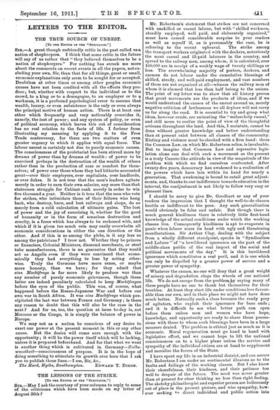LETTERS TO THE EDITOR.
THE TRUE SOURCE OF UNREST.
[To rim EDITOR 01 ma "Sracrklon."]
SIR,—A. great though unfriendly critic in the past called us a nation of.shopkeepers. I think that some critic in the future will say of us rather that " they believed themselves to be a nation of shopkeepers." For nothing has struck me more about the comments on recent events in all the papers, not ex- eluding your own, Sir, than that for all things, great or small, economic explanations only seem to be sought for or accepted. Doubtless at other times or among other peoples economic causes have not been credited with all the effects they pro- duce ; but, whether with respect to the individual or to the crowd, to a king or to a demagogue, to an employer or to . workman, it is a profound psychological error to assume that wealth, luxury, or even subsistence is the only or even always the principal motive of human action. There is at least one other which frequently and very noticeably overrides it, namely, the lust of power ; and any system of policy, or even of political economy, which leaves this out of consideration has no real relation to the facts of life. I forbear from illustrating my meaning by applying it to the Free Trade controversy, for there are two matters of even greater urgency to which it applies with equal force. The labour unrest is certainly not due to purely economic causes. The consciousness of the proletariat has been stirred more by dreams of power than by dreams of wealth : of power to be exercised perhaps in the destruction of the wealth of others rather than in the production of ease or comfort for them- selves ; of power over those whom they had hitherto accounted
great—over their employers, over capitalists, over landlords, or over dukes. It is not true that the men's leaders agitate
merely in order to earn their own salaries, any more than that statesmen struggle for Cabinet rank merely in order to win five thousand a year. Neither is it true that the men who vote for strikes, who intimidate those of their fellows who hang back, who destroy, burn, and loot railways and shops, do so merely from a cold calculation of ultimate gains. The lust of power and the joy of exercising it, whether for the good of humanity or in the form of senseless destruction and cruelty, is a force which has always to be reckoned with, and which if it is given too much rein may easily overwhelm all economic considerations in either the one direction or the other. And if this is so among the plebs, is it any less so among the patricians ? I trow not. Whether they be princes or financiers, Colonial Ministers, diamond merchants, or steel tube manufacturers, there is no guarantee that they would act as Angells even if they were convinced that econo- mically they had everything to lose by acting other- wise. Truly the Germans have more sense, or maybe more honesty, than we have ; for they admit that eine Maehtfrage is far more likely to produce war than any number of purely economic grievances, though these latter are indeed peculiarly calculated to keep Machtfragen before the eyes of the public. This was, of course, what happened before the Russo-Japanese War and before our own war in South Africa. It was eine lifaehy'rage which pre- cipitated the last war between France and Germany ; is there any reason to doubt that this will also be the case in the next And for us, too, the question at issue to-day is, not Morocco or the Congo, it is simply the balance of power in Europe.
We may not as a nation be conscious of any desire to exert our power at the present moment in this or any other cause. But the desire will come sure enough with the opportunity; it will be the power itself which will be lacking, unless it is prepared beforehand. And for that what we want is another thing which is cultivated in Germany—Zielbe- musstheit—eonsciousness of purpose. It is in the hope of doing something to stimulate its growth over here that I ask you to publish these lines.—I am, Sir, &c.,
The Hard, Hythe, Southampton. EDWARD T. DIXON.










































 Previous page
Previous page